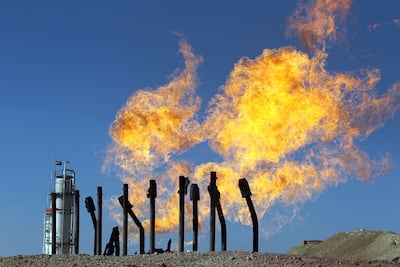The Iraqi Cabinet on Tuesday approved plans that will allow the Kurds to receive compensation for the costs of producing and transporting oil, in a significant move to ease the long-running oil dispute between the governments of Iraq and the Kurdistan Region.
Oil exports from the Kurdish Region through Turkey have been halted since March last year after an arbitration court ruled in favour of Baghdad, saying Ankara had breached a 1973 agreement when it allowed Kurds to pump without Baghdad's consent.
Since then, Baghdad and Kurdistan have failed to agree on different pending issues to resume exports, including the approval of the deals the Kurds signed unilaterally with oil companies and a system for payment for the developers.
According to the plan that was approved in the Cabinet weekly meeting, an international technical consulting body will be commissioned in agreement with the Kurdistan Region’s Natural Resources Ministry to calculate the “fair estimated costs for production and transportation for each field”, the statement said. If an agreement is not reached on the consulting company within 60 days, Baghdad will choose one, the cabinet said.
It also issued a decision for the “immediate commencement” of oil delivery produced in the region to the State Oil Marketing Organisation, and the Federal Ministry of Finance will cover production and transport costs “as an advance” at a rate of $16 a barrel, to be reconciled retroactively after the completion of the assessment by the consulting company.
In 2003, when the US led an international coalition to topple Saddam Hussein’s regime, oil and gas resources in Kurdistan region were not developed. Significant discoveries had been made, but they were left untapped.

After the 2003 invasion, the Kurds gained official autonomy, formalising a situation that had been in place since 1992, when Iraqi government forces withdrew from the region after their defeat in the 1991 Gulf War. That autonomy was strengthened and formally recognised in the 2005 Constitution.
As Baghdad and Erbil failed to agree on a federal law to govern the oil and gas sector, the Kurdish authorities signed dozens of oil and gas deals with foreign companies and countries.
Unlike other parts of Iraq, they offered lucrative production-sharing deals, which allowed international oil companies to rapidly recover costs, and split profits between the government and the oil company.
The Kurds said Iraq's constitution gave them the right to sign agreements without consulting Baghdad. But Baghdad maintained that those deals were illegal because it did not approve them. The KRG ultimately passed its own oil and gas law, which Iraq has never recognised.
The stop had serious consequences in the region, including layoffs and salary cuts, as producers have been forced to cut production while the regional government has been unable to dispense full salaries and social service payments.
Kurdistan oil sector has been the lifeblood for its local economy, accounting for 80 per cent of income. At the time when Turkey halted the exported, about 500,000 barrels of oil per day were sent to international markets. Of those, about 70,000 barrels came from Baghdad-run fields in the northern province of Kirkuk.


